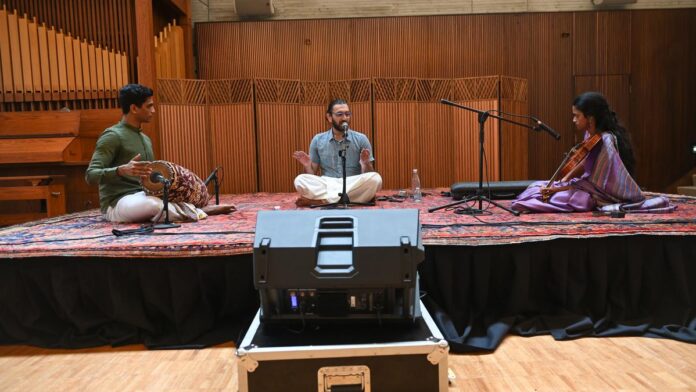
Emory OSRL hosts a Carnatic concert by Shiv Subramaniam at Cannon Chapel on March 23, 2023.
| Photo Credit: Becky Stein
A recent Carnatic concert presented in the south-eastern city of Atlanta in the U.S. reflected a beautiful amalgam of cultures, faiths, diasporas and demographics.
The event, organised by Emory University’s Office of Spiritual and Religious Life, and Telugu Studies, took place at Cannon Chapel, within Emory’s campus. The chapel hosts at least 20 diverse religious and philosophical gatherings weekly.
Flanked by the chapel’s organ and a piano and drum set, the artistes ensconced themselves for a 90-minute programme presented to a diverse audience.
The vocalist was Shiv Subramaniam, a student of P.S. Narayanaswamy, Vani Sateesh and Lakshmi Balasubramaniam. A Ph.D in Sanskrit and Comparative Literature from Columbia University, Shiv is an assistant professor of Religion at Emory University. On the violin was Sruti Sarathy, a native of the San Francisco Bay Area, a student of Anuradha Sridhar of the Lalgudi lineage and mentored by the Hindustani violinist Kala Ramnath, of the Mewati gharana. Arvind Narayan, on mridangam, who has lived in Atlanta for most of his life is a regular performer in the area. He learned mridangam from Santosh Chandru, Guruswami Iyer and Subra Viswanathan .
The team began the concert with Muthuswami Dikshitar’s ‘Brihadishvaro’ in Ganasamavarali, with kalpanaswarams. Shiv prefaced each song with succinct English descriptions. An alapana of Ritigowla was followed by the kriti ‘Dvaitamu sukhama’ and kalpanaswaras.
Tyagaraja’s ‘Niku tanaku’ in Begada, the main item, featured alapana, niraval, kalpanaswaras and tani avartanam. Shiv explained how Tyagaraja considers his relationship to god as that of a debtee and a debtor. Emory, being a leading institution in the U.S. for the study of Telugu literature and culture (with a department dedicated to Telugu studies), Shiv and Sruti had explored Telugu kritis with interesting lyrics that would also convey the beauty and engaging features of Carnatic music.
A composition by Sruti Sarathy in raga Bindumalini followed next. Sruti explains. “In 2020, following the death of George Floyd, I had several conversations with my Carnatic colleagues here: Shiv, Roopa Mahadevan, and others. We felt a desire to express our grief over the events that had taken place, and also, more than ever, a responsibility to clarify the values to which our music should speak: resistance against oppression, plurality, friendship, community-building, and justice. The starting point for me, ‘Tedade maname,’ which is traditional in form and contemporary in message, emerged out of thinking through these issues. The song uses language and references that are typical of traditional kritis (such as praasam), but it says: ‘O mind, do not seek sameness and similarity in the world. Instead, use your voice to sing and celebrate difference.’
This is an expression, through the medium of Carnatic music, of solidarity with Black Lives Matter.” Shiv adds, “Sruti and I believe that while many Carnatic compositions are devotional, the repertoire need not be limited to devotional themes. We incorporated this song to share our sense that Carnatic Music is for our world and our times.” The song appeared particularly apt for Atlanta, a city with an almost 50 per cent black demographic.
A medley of Tamil pieces followed, including viruthams by Kulasekara Azhwar and Arunagirinathar and C. Rajagopalachari’s ‘Kurai onrum illai’. Shiv’s crystal-clear pronunciation of the lyrics was commendable. Shiv, Sruti and Arvind received a standing ovation at the conclusion.
The writer is a Kalpalata Fellow for Classical Music Writings for 2023.
#chapel #echoed #Tyagaraja #kritis
